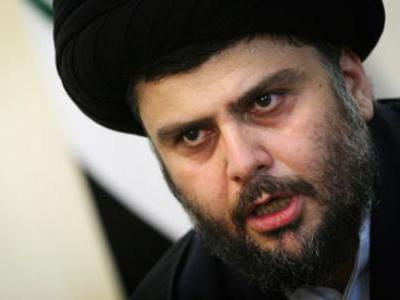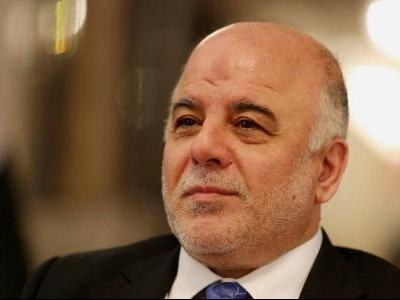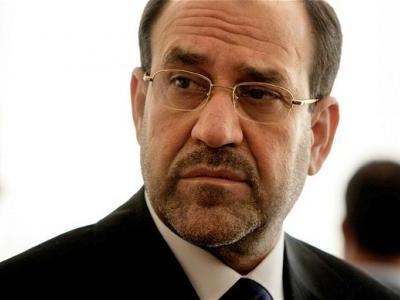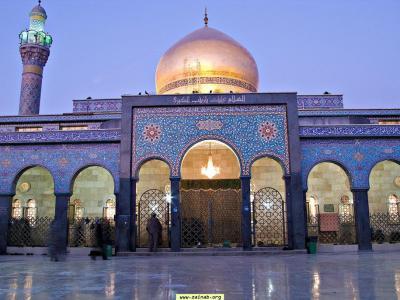Thu, 05/28/2015 - 02:23
Moqtada al-Sadr and Pentagon concur: It’s the wrong name at the wrong time
You know you’re in trouble when firebrand Iraqi Shiite cleric Moqtada al-Sadr thinks your operation codename is…well, a bit too firebrand Shiite for his taste.
Yes, it’s true. Scary Sadr, from the scary old Mahdi Army days, has weighed in on the latest debate over the codename given to a military operation to take back ISIS-controlled, Sunni areas of western Iraq.

On Tuesday, the Hashd al-Shaabi -- an umbrella for mostly Shiite militias sometimes called the Popular/People’s Mobilization Forces -- launched an operation to liberate ISIS-held parts of Iraq’s Sunni heartlands. The codename for the liberating mission, Hashd al-Shaabi spokesman Ahmed al-Assadi told reporters in Iraq, was “Operation Labaik ya Hussein”.
Ya Hussein, what sort of operation name is that for a Shiite force “liberating” their Sunni brothers?
“Labaik ya Hussein” has been translated by many news organizations as “We are at your service, Hussein” although Juan Cole’s version, “Here I am, O Husayn” is probably more accurate.
Hussein (also spelt Husayn or Hussain), one of Shiite Islam’s most revered imams, was the son of Imam Ali and Prophet Muhammad’s daughter, Fatimah Zahra. Hussein’s death during the 7th century Battle of Karbala marked the birth of Islam’s bitter Sunni-Shia divide and it’s an anniversary commemorated across the Shiite world with massive processions featuring paroxysms of grief and self-flagellation accompanied by chants, of which, “Labaik ya Hussein” is a central, rallying cry.
Over the centuries, tomes of theological discourse have been devoted to parsing and interpreting that cry of supplication. In a 2009 speech, Hezbollah chief Hassan Nasrallah kicked off a fiery discourse on the signature Shiite chant proclaiming, “The Americans don’t understand what ‘Labaik ya Hussein’ means. They pass over the meaning without knowing the significance of it,” he roared.
But this time, for once, the stupid Americans actually got it. In what is perhaps the biggest understatement of the current anti-ISIS campaign, Pentagon spokesman Col. Steve Warren expressed disappointment at the operation’s codename, calling it “unhelpful”.
Unhelpful? You bet.
A red rag for a wounded bull
Let’s be clear: Sunnis at large are not anti-Hussein. He is, after all, the grandson of the Prophet. They just don’t revere him as much as the Shiites. In the gentler, more tolerant old days -- before Saudi-funded Wahabism spread its austere, uncompromising tentacles across the Muslim world -- this codename would have been okay.
But today, it’s not -- and certainly not in today’s Iraq.
Naming an operation by saber-rattling Shiite militias into the disgruntled Iraqi Sunni heartlands “Labaik ya Hussein” is like waving a red rag at a bull. And this bull, I fear, could charge straight into ISIS’s arms.
ISIS –- or IS or ISIL or Daesh -– of course styles itself as the savior of marginalized Sunnis against the Iran-backed Shiite (and therefore apostate) powers in Baghdad and Damascus. That’s the prime ISIS recruitment card, especially in Iraq. For months now, US military officials having been desperately trying to win back the support of the Sahwa (Awakening) Sunni sheikhs who helped expel al Qaeda before the US pullout from Iraq.
Well, good luck to that effort. Convincing Iraq’s Sunni sheikhs to join “Operation Labaik ya Hussein” is like convincing the IRA to join an Orange march through Northern Ireland.
From great Arab armies to great Arab militias
When he replaced the disastrous Nuri al-Maliki as prime minister last year, Haider al-Abadi represented the hope that his predecessor’s sectarian way of doing business would end and that the new chief would be able to draw his disgruntled Sunni citizenry into the national fold.
But poor Abadi is looking more like the Viceroy of Baghdad than the prime minister of Iraq these days. Of course he would have preferred to rely solely on the Iraqi security forces. But let’s not waste time on that so called, once-great Arab army. US Defense Secretary Ash Carter was dead right in his assessment of the Iraqi security forces showing no will to battle ISIS, White House damage control notwithstanding. I haven’t seen a great Arab army winning any wars in my lifetime. But I hear, from history books, that they once roamed this earth.
These days, we have great Arab militias, which become even more powerful and even more destabilizing with time and battlefield victories.
And that, for Abadi -- a suave civilian politician raised in Baghdad’s affluent Karada district by his mother of Lebanese origin before moving to Britain to start an engineering business -- is a ticking bomb. The militias could present a threat to Abadi’s authority and if they do, all bets are off on how he will manage or weather that storm.

If Operation Labaik ya Hussein does succeed in liberating Ramadi and other ISIS-held regions, the Hashd al-Shaabi groups could well get even more cocky and triumphant. And we only have to look to Libya to see what happens when cocky, triumphant armed men believe they are national saviors and refuse to go gently into the night.
Maliki, the spoiler of Baghdad
Abadi’s position is further enfeebled by the presence of his predecessor playing spoiler in political and influential Shiite circles.
As journalist Borzou Daragahi noted in the Financial Times, “Abadi may be prime minister of Iraq, but he still does not live in the palace designated for him in the capital’s fortified Green Zone. That is because his predecessor, Nouri al-Maliki, has refused to move out.”

A “high-ranking member of Abdadi’s cabinet” told Daragahi that, “Maliki is opposed to every step the government makes…Deep down he [Maliki] feels he is being betrayed and he has been treated unfairly by everybody.”
This has alarming shades of the power play in another embattled Arab capital being ripped by the increasingly dangerous Sunni-Shia divide.
In the Yemeni capital of Sanaa, ousted autocrat Ali Abdullah Saleh has gone to bed with his old enemy, the Shiite Houthis, in a bid to undermine an already undermined Yemeni President Abed Rabbo Mansour Hadi, who is currently cooling his heels in exile in Saudi Arabia.
The longstanding political myth in the Arab world has been that it takes a strongman to govern and hold together these nations. When he was president, Saleh famously defined his job description as “dancing on the heads of snakes”. Hadi has proved to be a lumbering dancer. If Abadi is not able to rein in the Shiite militias and comes off as a well-meaning, urbane nice guy incapable of dancing on snakes or riding the Shiite militia tiger, this does not bode well for the security of Iraq as we once knew it.
As for Hezbollah’s ‘Labaik ya Zainab’
Meanwhile, in neighboring Syria, Hezbollah militants helping President Bashar al-Assad cling to power regularly chant, “Labaik ya Zainab” at the funerals of fellow fighters killed in Syria.
Zainab was Hussein’s sister, who was captured during the Battle of Karbala and taken to Damascus, then seat of Umayyad power and currently home to a magnificent shrine dedicated to the Prophet’s granddaughter. The defense of this Damascene shrine is an important propaganda chip in Hezbollah’s efforts to paint their support for Assad as a pan-Shiite resistance against the Sunnis.

Slogans like “Labaik ya Zainab” and Labaik ya Hussein” are redolent with textual and sub-textual meaning in the Muslim world -- as clerics like Hassan Nasrallah and Moqtada al-Sadr know all too well.
So, when Sadr issued a statement Wednesday acknowledging that the latest operation codename “is going to be misunderstood, there is no doubt,” someone should have listened to him.
Sadr even offered alternate mission names such as "Labaik ya Salaheddin" or "Labaik ya Anbar".
By late Wednesday, the Hashd al-Shaabi had heeded Sadr’s call, if not his alternate brand suggestions. Following complaints of sectarianism from local Anbaris who loudly proclaimed their distrust in paramilitaries that pursue “an Iranian agenda,” the Hashd finally announced a new codename.
Iraqi state TV said the paramilitaries had renamed the campaign "Labaik ya Iraq" with Hashd al-Shaabi spokesman Karim al-Nouri breezily declaring the old and new codenames had "the same meaning." The matter, according to Nouri, had been settled. "Now we have opted for 'Iraq' and there is no problem," he declared.
Alas, the problem hasn’t disappeared. The name change came too late to assure too many already suspicious Iraqi Sunnis, the damage has been done.
As I said, when the likes of Sadr represent the voices of moderation and inclusion, you know you’re in trouble. Especially since Sadr’s own paramilitary force, Saraya al-Salam, is involved in the Shiite militia fight against ISIS. This in turn underscores the precarious nature of the Hashed al-Shaabi alliance. Right now, there are signs of some competition between the groups. But, as Wednesday’s late name change shows, the alliance is holding together for the most in the joint fight against ISIS. If that cohesion starts to crumble though, and Iraqi Sunni disaffection only mounts, ya Hussein, we’re in for a very bloody period indeed.
Yes, it’s true. Scary Sadr, from the scary old Mahdi Army days, has weighed in on the latest debate over the codename given to a military operation to take back ISIS-controlled, Sunni areas of western Iraq.

On Tuesday, the Hashd al-Shaabi -- an umbrella for mostly Shiite militias sometimes called the Popular/People’s Mobilization Forces -- launched an operation to liberate ISIS-held parts of Iraq’s Sunni heartlands. The codename for the liberating mission, Hashd al-Shaabi spokesman Ahmed al-Assadi told reporters in Iraq, was “Operation Labaik ya Hussein”.
Ya Hussein, what sort of operation name is that for a Shiite force “liberating” their Sunni brothers?
“Labaik ya Hussein” has been translated by many news organizations as “We are at your service, Hussein” although Juan Cole’s version, “Here I am, O Husayn” is probably more accurate.
Hussein (also spelt Husayn or Hussain), one of Shiite Islam’s most revered imams, was the son of Imam Ali and Prophet Muhammad’s daughter, Fatimah Zahra. Hussein’s death during the 7th century Battle of Karbala marked the birth of Islam’s bitter Sunni-Shia divide and it’s an anniversary commemorated across the Shiite world with massive processions featuring paroxysms of grief and self-flagellation accompanied by chants, of which, “Labaik ya Hussein” is a central, rallying cry.
Over the centuries, tomes of theological discourse have been devoted to parsing and interpreting that cry of supplication. In a 2009 speech, Hezbollah chief Hassan Nasrallah kicked off a fiery discourse on the signature Shiite chant proclaiming, “The Americans don’t understand what ‘Labaik ya Hussein’ means. They pass over the meaning without knowing the significance of it,” he roared.
But this time, for once, the stupid Americans actually got it. In what is perhaps the biggest understatement of the current anti-ISIS campaign, Pentagon spokesman Col. Steve Warren expressed disappointment at the operation’s codename, calling it “unhelpful”.
Unhelpful? You bet.
A red rag for a wounded bull
Let’s be clear: Sunnis at large are not anti-Hussein. He is, after all, the grandson of the Prophet. They just don’t revere him as much as the Shiites. In the gentler, more tolerant old days -- before Saudi-funded Wahabism spread its austere, uncompromising tentacles across the Muslim world -- this codename would have been okay.
But today, it’s not -- and certainly not in today’s Iraq.
Naming an operation by saber-rattling Shiite militias into the disgruntled Iraqi Sunni heartlands “Labaik ya Hussein” is like waving a red rag at a bull. And this bull, I fear, could charge straight into ISIS’s arms.
ISIS –- or IS or ISIL or Daesh -– of course styles itself as the savior of marginalized Sunnis against the Iran-backed Shiite (and therefore apostate) powers in Baghdad and Damascus. That’s the prime ISIS recruitment card, especially in Iraq. For months now, US military officials having been desperately trying to win back the support of the Sahwa (Awakening) Sunni sheikhs who helped expel al Qaeda before the US pullout from Iraq.
Well, good luck to that effort. Convincing Iraq’s Sunni sheikhs to join “Operation Labaik ya Hussein” is like convincing the IRA to join an Orange march through Northern Ireland.
From great Arab armies to great Arab militias
When he replaced the disastrous Nuri al-Maliki as prime minister last year, Haider al-Abadi represented the hope that his predecessor’s sectarian way of doing business would end and that the new chief would be able to draw his disgruntled Sunni citizenry into the national fold.
But poor Abadi is looking more like the Viceroy of Baghdad than the prime minister of Iraq these days. Of course he would have preferred to rely solely on the Iraqi security forces. But let’s not waste time on that so called, once-great Arab army. US Defense Secretary Ash Carter was dead right in his assessment of the Iraqi security forces showing no will to battle ISIS, White House damage control notwithstanding. I haven’t seen a great Arab army winning any wars in my lifetime. But I hear, from history books, that they once roamed this earth.
These days, we have great Arab militias, which become even more powerful and even more destabilizing with time and battlefield victories.
And that, for Abadi -- a suave civilian politician raised in Baghdad’s affluent Karada district by his mother of Lebanese origin before moving to Britain to start an engineering business -- is a ticking bomb. The militias could present a threat to Abadi’s authority and if they do, all bets are off on how he will manage or weather that storm.

If Operation Labaik ya Hussein does succeed in liberating Ramadi and other ISIS-held regions, the Hashd al-Shaabi groups could well get even more cocky and triumphant. And we only have to look to Libya to see what happens when cocky, triumphant armed men believe they are national saviors and refuse to go gently into the night.
Maliki, the spoiler of Baghdad
Abadi’s position is further enfeebled by the presence of his predecessor playing spoiler in political and influential Shiite circles.
As journalist Borzou Daragahi noted in the Financial Times, “Abadi may be prime minister of Iraq, but he still does not live in the palace designated for him in the capital’s fortified Green Zone. That is because his predecessor, Nouri al-Maliki, has refused to move out.”

A “high-ranking member of Abdadi’s cabinet” told Daragahi that, “Maliki is opposed to every step the government makes…Deep down he [Maliki] feels he is being betrayed and he has been treated unfairly by everybody.”
This has alarming shades of the power play in another embattled Arab capital being ripped by the increasingly dangerous Sunni-Shia divide.
In the Yemeni capital of Sanaa, ousted autocrat Ali Abdullah Saleh has gone to bed with his old enemy, the Shiite Houthis, in a bid to undermine an already undermined Yemeni President Abed Rabbo Mansour Hadi, who is currently cooling his heels in exile in Saudi Arabia.
The longstanding political myth in the Arab world has been that it takes a strongman to govern and hold together these nations. When he was president, Saleh famously defined his job description as “dancing on the heads of snakes”. Hadi has proved to be a lumbering dancer. If Abadi is not able to rein in the Shiite militias and comes off as a well-meaning, urbane nice guy incapable of dancing on snakes or riding the Shiite militia tiger, this does not bode well for the security of Iraq as we once knew it.
As for Hezbollah’s ‘Labaik ya Zainab’
Meanwhile, in neighboring Syria, Hezbollah militants helping President Bashar al-Assad cling to power regularly chant, “Labaik ya Zainab” at the funerals of fellow fighters killed in Syria.
Zainab was Hussein’s sister, who was captured during the Battle of Karbala and taken to Damascus, then seat of Umayyad power and currently home to a magnificent shrine dedicated to the Prophet’s granddaughter. The defense of this Damascene shrine is an important propaganda chip in Hezbollah’s efforts to paint their support for Assad as a pan-Shiite resistance against the Sunnis.

Slogans like “Labaik ya Zainab” and Labaik ya Hussein” are redolent with textual and sub-textual meaning in the Muslim world -- as clerics like Hassan Nasrallah and Moqtada al-Sadr know all too well.
So, when Sadr issued a statement Wednesday acknowledging that the latest operation codename “is going to be misunderstood, there is no doubt,” someone should have listened to him.
Sadr even offered alternate mission names such as "Labaik ya Salaheddin" or "Labaik ya Anbar".
By late Wednesday, the Hashd al-Shaabi had heeded Sadr’s call, if not his alternate brand suggestions. Following complaints of sectarianism from local Anbaris who loudly proclaimed their distrust in paramilitaries that pursue “an Iranian agenda,” the Hashd finally announced a new codename.
Iraqi state TV said the paramilitaries had renamed the campaign "Labaik ya Iraq" with Hashd al-Shaabi spokesman Karim al-Nouri breezily declaring the old and new codenames had "the same meaning." The matter, according to Nouri, had been settled. "Now we have opted for 'Iraq' and there is no problem," he declared.
Alas, the problem hasn’t disappeared. The name change came too late to assure too many already suspicious Iraqi Sunnis, the damage has been done.
As I said, when the likes of Sadr represent the voices of moderation and inclusion, you know you’re in trouble. Especially since Sadr’s own paramilitary force, Saraya al-Salam, is involved in the Shiite militia fight against ISIS. This in turn underscores the precarious nature of the Hashed al-Shaabi alliance. Right now, there are signs of some competition between the groups. But, as Wednesday’s late name change shows, the alliance is holding together for the most in the joint fight against ISIS. If that cohesion starts to crumble though, and Iraqi Sunni disaffection only mounts, ya Hussein, we’re in for a very bloody period indeed.
Comments or opinions expressed on this blog are those of the individual contributors only, and do not necessarily represent the views of FRANCE 24. The content on this blog is provided on an "as-is" basis. FRANCE 24 is not liable for any damages whatsoever arising out of the content or use of this blog.




0 Comments
Post new comment